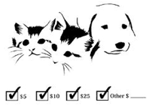DACF Home → Bureaus & Programs → Bureau of Agriculture → Division of Animal and Plant Health → Animal Welfare Program
Animal Welfare Program
Public Meetings
News
5/21/2025 - Statement from the Maine Department of Agriculture, Conservation and Forestry Animal Welfare Program Regarding Ongoing Investigations
Animal Welfare License Plate
 The Pine Tree Plate will be replacing the Chickadee Plate starting May 1, 2025. Now is a great time to switch to the Animal Welfare Plate and support the Help Fix ME program.
Learn More about Animal Welfare's License Plate
The Pine Tree Plate will be replacing the Chickadee Plate starting May 1, 2025. Now is a great time to switch to the Animal Welfare Plate and support the Help Fix ME program.
Learn More about Animal Welfare's License Plate
Pet Food Pantries
Online Resources
How to Contact the Animal Welfare Office
To report an animal cruelty or neglect complaint during business hours 8 am to 4:00 pm, Monday through Friday:
Complaints received via email must contain the reporting party’s name and phone number; the name of the animal owner, (if known), a physical address, a description of the animals and the type of complaint.
- (207) 287-3846
- (877) 269-9200 (Toll Free)
- animal.welfare@maine.gov
For an emergency outside of business hours:
Please call the Bangor Barracks of the State Police, 207-973-3700, and they will contact an Animal Welfare Program representative.
Animal Control Officer Contacts
Support the Animal Welfare Program
Support Animal Welfare License Plate

The proceeds from the Support Animal Welfare specialty plate will be equally distributed between the Animal Welfare Auxiliary Fund and the Companion Animal Sterilization Fund.
Donations
Help fight animal cruelty and pet overpopulation in the State of Maine by making a donation online!
Income Tax Form Check Off

Make a voluntary contribution to Maine's Companion Animal Sterilization Fund on your income tax return. On your Maine State Tax Form, check the box called The Companion Animal Sterilization Fund.
The fund will be used to save lives by:
- spaying/neutering cats and dogs
- preventing unwanted litters
- lowering shelter intakes
- lowering shelter euthanasia
- reducing the number of feral cats
- reducing dog bites